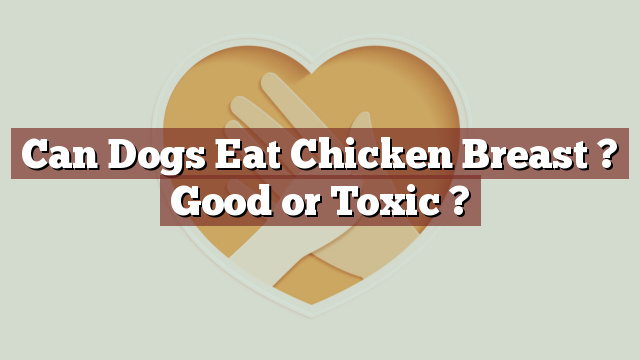Can Dogs Eat Chicken Breast? Good or Toxic?
It is essential for pet owners to be aware of the safe and toxic foods for their beloved furry friends. When it comes to chicken breast, a common question often arises: can dogs eat chicken breast? Let’s delve into the topic and explore the nutritional value, safety, potential risks, and benefits of feeding dogs chicken breast.
Nutritional Value of Chicken Breast for Dogs
Chicken breast is a lean source of protein that is highly beneficial for dogs. It contains essential amino acids that contribute to muscle growth, repair, and overall development. Additionally, chicken breast is rich in vitamins B3 and B6, which aid in promoting energy production and maintaining a healthy nervous system. Moreover, it is a good source of phosphorus, which is crucial for bone health.
Is Chicken Breast Safe or Toxic for Dogs?
Yes, dogs can safely eat chicken breast. In fact, many commercial dog food brands include chicken as a primary ingredient due to its nutritional value. However, there are a few precautions to keep in mind. It is crucial to feed dogs plain, cooked chicken breast without any seasoning, bones, or skin. Bones can pose a choking hazard and may splinter, causing internal injuries. The skin, especially when seasoned or fried, can be high in fat and may lead to digestive issues or pancreatitis in dogs.
Potential Risks and Benefits of Feeding Dogs Chicken Breast
Feeding dogs chicken breast in moderation can provide several health benefits. The lean protein content promotes muscle development and helps maintain a healthy weight. The vitamins and minerals present in chicken breast contribute to a strong immune system and promote overall well-being. However, it is important to ensure that chicken breast is not the sole component of a dog’s diet, as they require a balanced mix of nutrients from various sources.
On the other hand, there are a few potential risks associated with feeding dogs chicken breast. As mentioned earlier, seasoning, bones, and skin should be avoided. Additionally, some dogs may be allergic to chicken. If you notice any signs of an allergic reaction such as itching, vomiting, or diarrhea, it is crucial to consult a veterinarian.
What to Do if Your Dog Eats Chicken Breast
If your dog accidentally consumes chicken breast with bones or skin, it is important to monitor them closely for any signs of distress. In cases of small bone ingestion, it is advisable to contact your vet for guidance. They may recommend monitoring your dog or conducting an examination to ensure there are no internal injuries. If your dog shows signs of an allergic reaction or experiences any abnormal symptoms, seeking immediate veterinary assistance is crucial.
Conclusion: Chicken Breast Can Be a Healthy Addition to a Dog’s Diet
In conclusion, dogs can eat chicken breast as long as it is plain, cooked, and boneless. It provides a valuable source of lean protein and essential nutrients. However, it is crucial to exercise caution and avoid feeding dogs chicken breast with bones, skin, or seasoning. As with any dietary change, it is recommended to introduce chicken breast gradually and monitor your dog’s response. If in doubt, always consult with a veterinarian to ensure your dog’s diet is healthy and balanced.
Thank you for investing your time in exploring [page_title] on Can-Eat.org. Our goal is to provide readers like you with thorough and reliable information about various dietary topics. Each article, including [page_title], stems from diligent research and a passion for understanding the nuances of our food choices. We believe that knowledge is a vital step towards making informed and healthy decisions. However, while "[page_title]" sheds light on its specific topic, it's crucial to remember that everyone's body reacts differently to foods and dietary changes. What might be beneficial for one person could have different effects on another. Before you consider integrating suggestions or insights from "[page_title]" into your diet, it's always wise to consult with a nutritionist or healthcare professional. Their specialized knowledge ensures that you're making choices best suited to your individual health needs. As you navigate [page_title], be mindful of potential allergies, intolerances, or unique dietary requirements you may have. No singular article can capture the vast diversity of human health, and individualized guidance is invaluable. The content provided in [page_title] serves as a general guide. It is not, by any means, a substitute for personalized medical or nutritional advice. Your health should always be the top priority, and professional guidance is the best path forward. In your journey towards a balanced and nutritious lifestyle, we hope that [page_title] serves as a helpful stepping stone. Remember, informed decisions lead to healthier outcomes. Thank you for trusting Can-Eat.org. Continue exploring, learning, and prioritizing your health. Cheers to a well-informed and healthier future!

